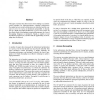Free Online Productivity Tools
i2Speak
i2Symbol
i2OCR
iTex2Img
iWeb2Print
iWeb2Shot
i2Type
iPdf2Split
iPdf2Merge
i2Bopomofo
i2Arabic
i2Style
i2Image
i2PDF
iLatex2Rtf
Sci2ools
117
click to vote
ICS
1993
Tsinghua U.
1993
Tsinghua U.
The Effectiveness of Decoupling
This paper examines the effectiveness of decoupling as an optimization technique for high-performance computer architectures. Decoupled access execute architectures are described, and the concept of control decoupling is introduced and justified. A description of a highly-decoupled architecture is given, and a metric for the effectiveness of decoupling on particular programs, the Loss of Decoupling frequency is introduced. Finally, a number of real benchmark programs are examined and the applicability of decoupling them is analyzed.
Access Execute Architectures | Distributed And Parallel Computing | ICS 1993 | Optimization Technique | Real Benchmark Programs |
Related Content
| Added | 09 Aug 2010 |
| Updated | 09 Aug 2010 |
| Type | Conference |
| Year | 1993 |
| Where | ICS |
| Authors | Peter L. Bird, Alasdair Rawsthorne, Nigel P. Topham |
Comments (0)

